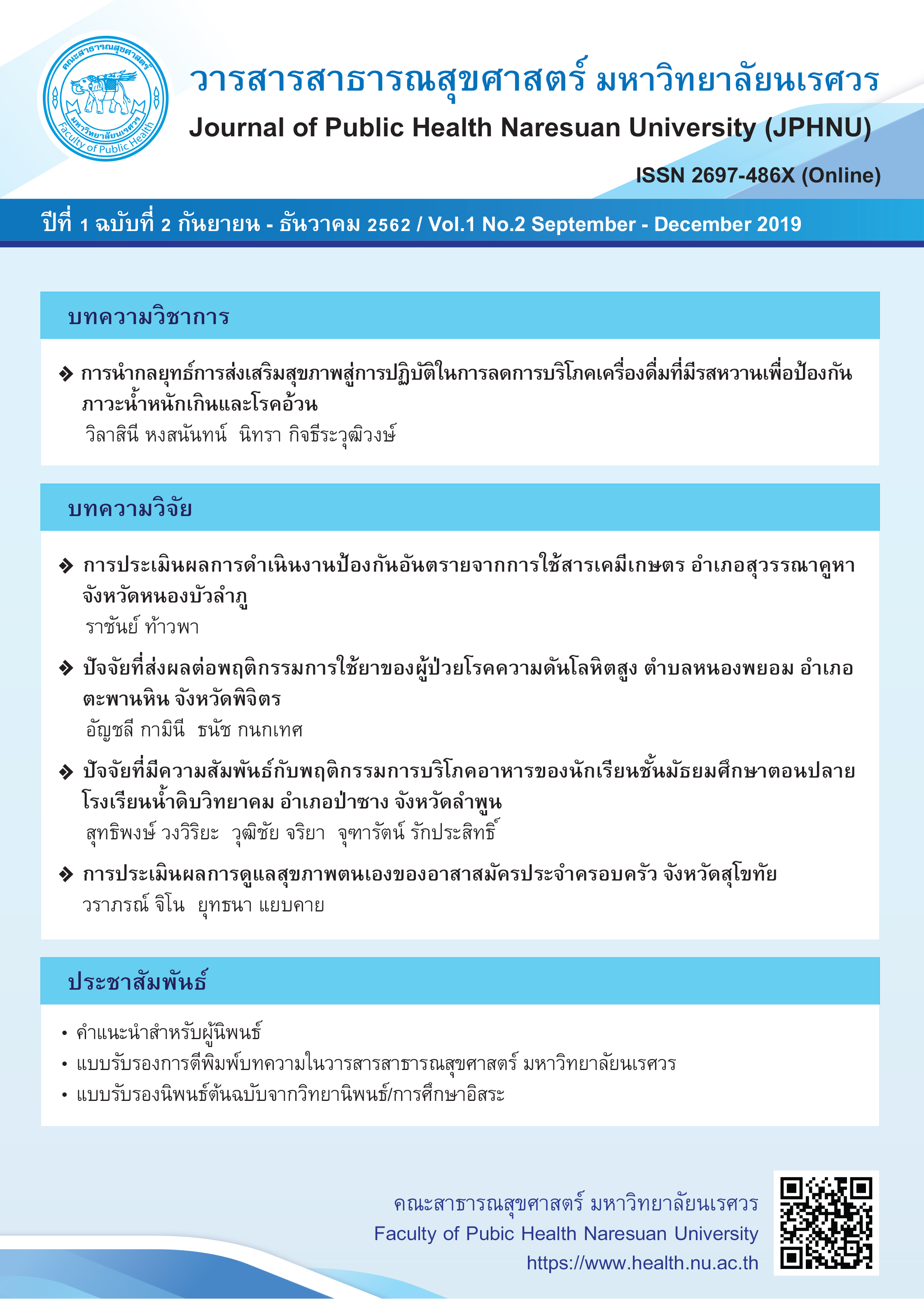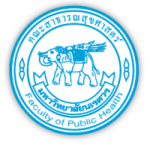Implementation of health promotion strategies to practice in reducing sugar-sweetened beverage consumption to reduce the risk of overweight and obesity
Keywords:
Health promotion strategy, Sugar-sweetened beverage (SSB) consumption, Overweight and obesityAbstract
Sugar-sweetened beverage (SSB) consumption is a common modifiable risk factor that was in the dimension of an unhealthy diet. World Health Organization and Thailand have considered in SSB as seen in a rapidly increasing of overweight and obesity that related to chronic disease in the future. Thailand implemented health promotion to reduce SSB consumption that was conducted parallel in policy, environment, community, individual, and health services following health promotion strategy.This article presents the situation of SSB consumption, the health impact of SSB, the association of SSB and chronic disease, health promotion, implementing of health promotion in reducing SSB consumption, and synthesis the next step of health promotion in practicing health promotion to reduce SSB consumption to design an appropriate intervention in the community. The contribution will be lead to decrease overweight and obesity.
References
Aunprom-Me, S. (2013). Milestones in Health Promotion: Statements from global conferences. Nonthaburi: Project of Praboromarajchanok Institute for Health Workforce Development. (in Thai).
Bernabé, E., Vehkalahti, M. M., Sheiham, A., Aromaa, A., & Suominen, A. L. (2014). Sugar-sweetened beverages and dental caries in adults: A 4-year prospective study. Journal of Dentistry, 42(8), 952-958.
Bleich, S. N., & Vercammen, K. A. (2018). The negative impact of sugar-sweetened beverages on children's health: an update of the literature. BMC Obesity, 5(6). doi:10.1186/s40608-017-0178-9.
Bureau of Dental Health. (2012). Report of the National Oral Health Survey 7th 2012. Nonthaburi: Ministry of Public Health. (in Thai).
Bureau of Dental Health. (2018). Report of the National Oral Health Survey 8th 2018. Nonthaburi: Ministry of Public Health. (in Thai).
Bureau of Food. (2016). Handbook of Healthier Choice for Thai people. Nonthaburi: Food and Drug Administration. (in Thai).
Bureau of Food. (2019). Law and Regulation. Retrieved Feb 20, 2019, from https://food.fda.moph.go.th/law/announ_moph151-200.php. (in Thai).
Bureau of Health Promotion. (2017). Manual of School Health Promotion (Revised edition 2015). Nonthaburi: Ministry of Public Health. (in Thai).
Centers for Disease Control and Prevention. (2010). The CDC guide to strategies for reducing the consumption of sugar-sweetened beverages. Retrieved Feb 19, 2019, from https://stacks.cdc.gov/view/cdc/51532.
de Boer, E. C., de Rooij, S. R., Olthof, M. R., & Vrijkotte, T. G. M. (2018). Sugar-sweetened beverages intake is associated with blood pressure and sympathetic nervous system activation in children. Clinical Nutrition ESPEN, 28, 232-235.
Department of Health. (2017). Department of Health Annual Report 2017. Nonthaburi: Department of Health. (in Thai).
Food and Drug Administration. (2017). Development of Food consumption behavior of Oryornoi Students for reducing risk factors of NCDs. Nonthaburi: Ministry of Public Health. (in Thai).
Fung, T. T., Malik, V., Rexrode, K. M., Manson, J. E., Willett, W. C., & Hu, F. B. (2009). Sweetened beverage consumption and risk of coronary heart disease in women. The American Journal of Clinical Nutrition, 89(4), 1037-1042.
Hu, D., Cheng, L., & Jiang, W. (2019). Sugar-sweetened beverages consumption and the risk of depression: A meta-analysis of observational studies. Journal of Affective Disorders, 245, 348-355.
Hu, Y., Costenbader, K. H., Gao, X., Al-Daabil, M., Sparks, J. A., Solomon, D. H. et al. (2014). Sugar-sweetened soda consumption and risk of developing rheumatoid arthritis in women. The American Journal of Clinical Nutrition, 100(3), 959-967.
Huang, X., Zhang, J., Li, J., Zhao, S., Xiao, Y., Huang, Y., et al. (2018). Daily Intake of Soft Drinks and Moderate-to-Severe Acne Vulgaris in Chinese Adolescents. The Journal of Pediatrics, 204, 256-262.
Kassebaum, N. J., Smith, A. G. C., Bernabe, E., Fleming, T. D., Reynolds, A. E., Vos, T. et al. (2017). Global, Regional, and National Prevalence, Incidence, and Disability-Adjusted Life Years for Oral Conditions for 195 Countries, 1990-2015: A Systematic Analysis for the Global Burden of Diseases, Injuries, and Risk Factors. Journal of Dental Research, 96(4), 380-387.
Kibblewhite, R., Nettleton, A., McLean, R., Haszard, J., Fleming, E., Kruimer, D., & Te Morenga, L. (2017). Estimating Free and Added Sugar Intakes in New Zealand. Nutrients, 9(12) 1292; https://doi.org/10.3390/nu9121292
Kok, G., Gottlieb, N. H., Commers, M., & Smerecnik, C. (2014). The ecological approach in health promotion programs: a decade later. American Journal of Health Promotion, 22(6), 437-441.
Kriengsinyos, W., Chan, P., & Amarra, M. S. V. (2018). Consumption and sources of added sugar in Thailand: a review. Asia Pacific Journal of Clinical Nutrition, 27(2), 262-283.
Lim, L., Banwell, C., Bain, C., Banks, E., Seubsman, S. A., Kelly, M., et al. (2014). Sugar sweetened beverages and weight gain over 4 years in a Thai national cohort-a prospective analysis. PLOS ONE, 9(5), e95309.
Luger, M., Winzer, E., Lafontan, M., Bes-Rastrollo, M., Yumuk, V., & Farpour-Lambert, N. (2018). Sugar-Sweetened Beverages and Weight Gain in Children and Adults: A Systematic Review from 2013 to 2015 and a Comparison with Previous Studies. Obesity Facts, 10(6), 674-693.
Ma, J., Fox, C. S., Jacques, P. F., Speliotes, E. K., Hoffmann, U., Smith, C. E., et al. (2015). Sugar-sweetened beverage, diet soda, and fatty liver disease in the Framingham Heart Study cohorts. Journal of Hepatology, 63(2), 462-469.
National Health Commission Office. (2015). Healthy Public Policy. Retrieved Feb 20, 2019, from https://phpp.nationalhealth.or.th/. (in Thai).
National Statistical Office. (2013). The Survey of Food Consumption 2013. Nonthaburi: National Statistical Office. (in Thai).
National Statistical Office. (2017). The Survey of Food Consumption 2017. Nonthaburi: National Statistical Office. (in Thai).
Pantaewan, P. (2017). Ecological Model and Health Behavior Change. Journal of The Royal Thai Army Nurses, 18(2), 7-15. (in Thai).
Papier, K., D'Este, C., Bain, C., Banwell, C., Seubsman, S., Sleigh, A., & Jordan, S. (2017). Consumption of sugar-sweetened beverages and type 2 diabetes incidence in Thai adults: results from an 8-year prospective study. Nutrition and Diabetes, 7(6), e283.
Pase, M. P., Himali, J. J., Jacques, P. F., DeCarli, C., Satizabal, C. L., Aparicio, H., et al. (2017). Sugary beverage intake and preclinical Alzheimer & disease in the community. Alzheimer's and Dementia, 13(9), 955-964.
Popkin, B. M., & Hawkes, C. (2016). Sweetening of the global diet, particularly beverages: patterns, trends, and policy responses. The Lancet Diabetes & Endocrinology, 4(2), 174-186.
Project of the development of Healthier Choice. (2015). Handbook of the certification of healthier choice. Retrieved Feb 20, 2019, from https://healthierlogo.com/wp-content/uploads/2017/10/ Thai_bookhealthierchoice.pdf. (in Thai).
Singh, G. M., Micha, R., Khatibzadeh, S., Shi, P., Lim, S., Andrews, K. G., et al. (2015). Global, Regional, and National Consumption of Sugar-Sweetened Beverages, Fruit Juices, and Milk: A Systematic Assessment of Beverage Intake in 187 Countries. PLOS ONE, 10(8), e0124845.
Swan, G. E., Powell, N. A., Knowles, B. L., Bush, M. T., & Levy, L. B. (2018). A definition of free sugars for the UK. Public Health Nutrition, 21(9), 1636-1638.
The Excise Department. (2017). Excise Tax Laws 2017. Retrieved Feb 20, 2019, from https://www.excise.go.th/cs/groups/public/documents/document/dwnt/mze5/~edisp/uatucm319919.htm. (in Thai).
Van Horn, L., Johnson, R. K., Flickinger, B. D., Vafiadis, D. K., & Yin-Piazza, S. (2010). Translation and implementation of added sugars consumption recommendations: a conference report from the American Heart Association Added Sugars Conference 2010. Circulation, 122(23), 2470-2490.
Wang, M., Yu, M., Fang, L., & Hu, R. Y. (2015). Association between sugar-sweetened beverages and type 2 diabetes: A meta-analysis. Journal of Diabetes Investigation, 6(3), 360-366.
WHO. (2005). Preventing chronic disease: a vital investment. Retrieved Feb 20, 2019, from https://www.who.int/chp/chronic_disease_report/en/.
WHO. (2014). Report of the First Meeting of the Ad hoc Working Group on Science and Evidence for Ending Childhood Obesity. Geneva: World Health Organization.
WHO. (2015). Guideline Sugars intake for adults and children. Geneva: World Health Organization.
WHO. (2016a). Report of the commission on ending childhood obesity. Switzerland: World Health Organization
WHO. (2016b). WHO calls on countries to reduce sugars intake among adults and children. Retrieved Feb 20, 2019, from https://www.who.int/mediacentre/news/releases/2015/sugar-guideline/en/.
WHO. (2017). Sugars and dental caries Technical information note. Retrieved Feb 20, 2019, from https://www.who.int/oral_health/publications/sugars-dental-caries-keyfacts/en/.
WHO. (2018). Reducing consumption of sugar-sweetened beverages to reduce the risk of unhealthy weight gain in adults. Retrieved Feb 20, 2019, from https://www.who.int/elena/titles/ssbs_adult_ weight/en/.
World Health Organization. (1998). Health Promotion Glossary. Geneva: World Health Organization.
Yngve, A., Haapala, I., Hodge, A., McNeill, G., & Tseng, M. (2012). Making soft drinks the dietary version of the cigarette. Public Health Nutrition, 15(8), 1329-1330.
Yuzbashian, E., Asghari, G., Mirmiran, P., Zadeh-Vakili, A., & Azizi, F. (2016). Sugar-sweetened beverage consumption and risk of incident chronic kidney disease: Tehran lipid and glucose study. Nephrology, 21(7), 608-616.
Downloads
Published
How to Cite
Issue
Section
License
The published article is copyrighted by the Journal of Public Health and Health Sciences Research.
The statements that appear in each article in this academic and research journal are the personal opinions of each author and are not related to Naresuan University and other faculty members in the university. Responsibilities regarding each article are the responsibility of each author.






